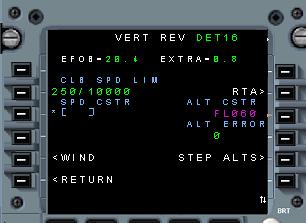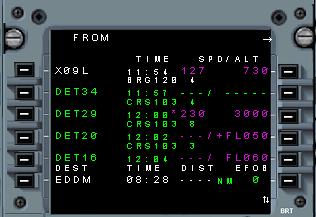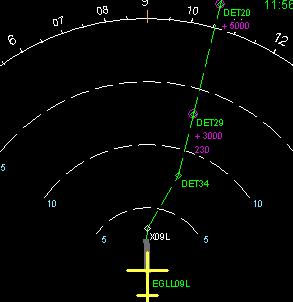
Copyright D.P. Browne 2011
Altitude Constraint
An altitude constraint may be automatically applied to a waypoint as part of the SID or STAR procedure. A speed constraint may also be manually entered for a waypoint by the flight crew. The altitude constraint applies to the waypoint it has been created for.
There are 2 ways to enter a altitude constraint. It may be enter via the the altitude constraint prompts on a vertical revision page for the waypoint or it may be entered directly ion the flight plan page for the waypoint.
Select the Flight Plan page by pressing the F-
Select a vertical Revision at the required waypoint
Select the Flight Plan page by pressing the F-
Write the altitude Limit value into the scratchpad
Ensure to write a slash “/” first or else the value will be interpreted as a speed constraint.
Examples :
/2500
/+FL320
/-
Page the flight plan Up/Down as required to put the required waypoint in view on the flight plan page
A altitude constraint may will be shown as its actual value in magenta on the flight plan, if performance calculations have not yet been enabled. Thereafter, a magenta astrix will appear by the altitude value for the waypoint with a altitude constraint.
Altitude constraints are
At Altitude
At or Above Altitude
At or Below Altitude
2500
+2500
-



Constraints show up on the ND as circled waypoints. The actual constraint Above, At or below is shwon next to them
/+Altitude means At or Above
/-
/Altitude means At altitude
Clearing a constraint
A speed, altitude or RTA constraint for any waypoint, may be cleared by selecting the CLR button and the Right LSK associated with the waypoint on the flight plan page. Note that this action clears all the constraints for the waypoint.





